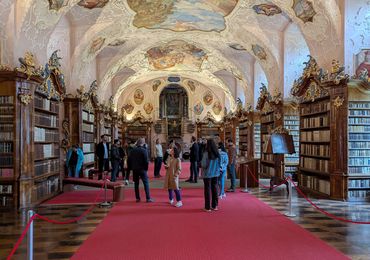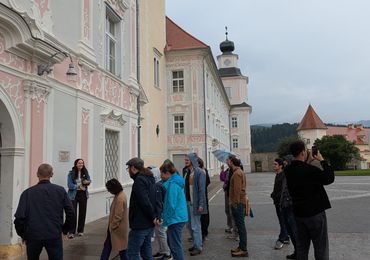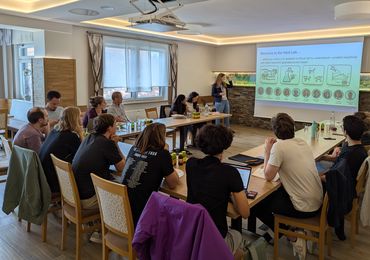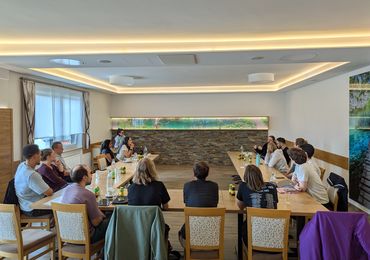Day 1: iCAIML Retreat 2025
The first retreat of iCAIML Doctoral College took place on September 23-24 in St. Lorenzen, Styria.
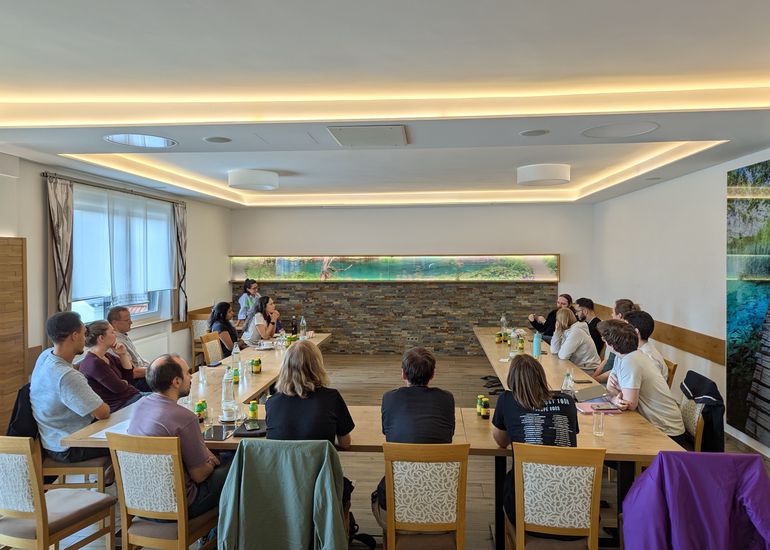
On This Page
The first iCAIML Doctoral College retreat took place on September 23-24 in St. Lorenzen, Styria.
About the Event
On the first day of the retreat, Zeynep Aksöz Balzar opened with a critical look at how AI shapes architecture and design. Esther Heid shared practical strategies for writing successful funding proposals. Alongside talks, shared meals, discussions, and a visit to Vorau Abbey (Stift Vorau) created space for reflection and exchange in a supportive setting.
Below you can find the abstracts of the talks and information about speakers of the first day.
Talks and Speakers of Day 1
AI Overload
Zeynep Aksöz Balzar
This lecture explores the physical embodiments of artificial intelligence and their transformative role in architecture and design. While AI has long been understood as an abstract, computational system, recent developments foreground its potential as an agent embedded in material, spatial, and ecological contexts. The talk will situate where we currently stand with AI—between generative design tools, machine learning systems, and large-scale language models—while critically questioning their cultural, social, and spatial implications.
From the perspective of architecture, AI is no longer confined to optimization or automation; it becomes a collaborative partner that can shape emergent forms, multisensory interactions, and adaptive environments. By presenting case studies from research and practice, the lecture will propose new perspectives on how architecture can engage with AI: as a medium for co-creation, as a catalyst for ecological awareness, and as a driver of speculative futures where the boundaries between human, non-human, and artificial agents are redefined.
Zeynep Aksöz Balzar
Zeynep Aksöz Balzar is a Turkish architect, creative coder, and arts-based researcher whose transdisciplinary practice explores the intersection of algorithmic systems, technologically mediated interaction, and AI embodiment. Her work focuses on reciprocal relationships between human, non-human, and artificial agents, developing emergent design approaches through playful, collaborative, and process-driven methodologies.
She is Assistant Professor at TU Wien, Research Associate and Lecturer at the University of Applied Arts Vienna, and Faculty at IAAC Barcelona. She co-leads the Vienna-based design and research collective Open Fields, where she engages with ecology, interaction, and machine learning in both artistic and architectural contexts. Zeynep has exhibited and presented internationally, including at the Venice Architecture Biennale, London Design Festival, BOZAR Brussels, Kuandu Museum of Art Taipei, and the Estonian Academy of Arts. Her creative and scientific work has been published in Fabricate, Design Transactions, and in proceedings such as ACADIA and the Design Modeling Symposium.
She is the recipient of the Austrian Chamber of Architects’ Research Prize, the Margarete Schütte-Lihotzky Stipendium, AI in Arts funding, and is a former Marie Curie Fellow. She is currently co-leading funded projects such as Vibrant Fields (FWF PEEK) and Morphology of Sound (INTRA). Educated in Vienna, London, and Madrid, she holds a Doctoral degree from the University of Applied Arts Vienna, an MArch from the Architectural Association’s Emergent Technologies and Design program, and an MSc from TU Wien.
Proposal writing: How to sell your project idea
Esther Heid
Turning a research idea into a funded project requires more than excellent science. It also requires the ability to convince reviewers that your vision is both exciting and feasible. In this talk, I will share practical strategies for writing strong proposals, drawing on my own experiences with programs such as the ERC Starting Grant, FWF START, FFG BRIDGE industry projects, FWF Schrödinger postdoc fellowships, and ÖAW DOC. We will discuss how to craft a compelling story that highlights novelty, impact, and feasibility, how to tailor applications to different funding schemes, and how to present your project in a way that captures the reviewers’ attention. Beyond writing, I will also address how to deal with possible rejection letters and how to adapt when a funded project takes unexpected turns. The aim is to provide PhD students with concrete tools and an honest perspective on proposal writing, helping them sell their project ideas effectively while building resilience for the ups and downs of an academic career.
Esther Heid
Esther Heid received her Ph.D. in Theoretical Chemistry from the University of Vienna in 2019. She subsequently held postdoctoral positions at MIT (2020–2022) and TU Wien (2022–2024), where she advanced her work at the interface of chemistry and machine learning. In 2024, she was awarded a prestigious ERC Starting Grant, as well as a FWF START grant, which supported her promotion to tenure-track Assistant Professor at TU Wien. Her research group focuses on deep learning approaches for chemical reactions, with an emphasis on graph-convolutional neural networks, graph transformers, and language transformers, as well as developing new generative approaches to model reaction pathways.


